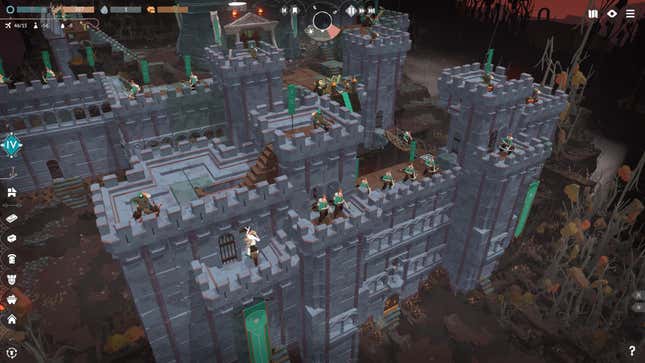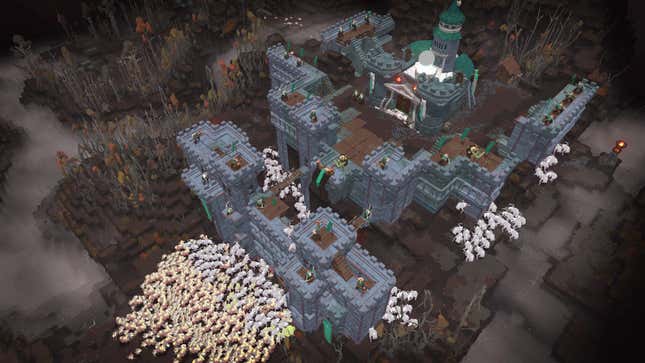Cataclismo Is The Lego Strategy Game Of My Dreams So Far

I love strategy games, but getting into a new one is always an uphill struggle for me. There’s a ton of new information to take in, new systems to familiarize myself with, and all of the odd quirks and clumsy controls to get accustomed to. But every once in a while one of them instantly gets their hooks in me and doesn’t let go. Right now that’s Cataclismo, an excellent tower defense city builder that uses what’s cool about Lego to elevate a strategy game from good to great.
Out on Steam and Humble Bundle in Early Access on July 22, Cataclismo is published by Hooded Horse and the third game from creators Digital Sun, the indie team behind merchant RPG Moonlighter and League of Legends action brawler The Mageseeker. It’s a radical departure in that regard, exchanging the action-RPG dungeon-crawling structure for a horde mode management sim about building air purifiers. I’ve played about five hours of the campaign mode (there’s also skirmish and endless modes) so far and it’s currently that game I check-in on before going to bed only to look up and realize it’s already midnight by the time I’m finished.
Cataclismo takes place in a post-apocalyptic, gothic-punk world where armies of enemies called Horrors creep out of oceans of mist to lay siege to survivor outposts and kingdoms. During the day you explore the map with your troops, killing nearby enemies and salvaging resources, while also building up your settlement and preparing for the onslaught of Horrors at night. Balanced development means having the resources you need to build strong defenses, while the battles at night are mostly about sitting back and watching your best laid plans creak and crumble under the stress of the the hordes.
So far this will all sound familiar to anyone who’s played They Are Billions, the hit 2019 tower defense real-time strategy game by Numantian Games. What sets Cataclismo apart isn’t necessarily what you build but how you build it. While buildings like homes and barracks are standard, pre-made units, walls, towers, and bridges for crossing the game’s fractured world are all constructed individually block-by-block. And because maps are so dense, the most efficient way to build up a settlement while also keeping it secure is to expand upwards instead of outwards. The result often looks like dark fantasy shanty town held up by a labyrinth of stone walls and wooden scaffolding. Maybe this sounds tedious to you. I promise it’s not.
I mentioned air purifiers earlier. Clean air is a key resource in Cataclismo. Buildings need it. Soldiers need it. And researching upgrades also requires a big chunk. Capturing it requires building an air purifier high enough off the ground that you get as much air harvested per minute as possible. Building it high off the ground means creating a tall block of wood scaffolding and, because all buildings must be accessible to ambient workers controlled automatically by your settlement in order to produce resources, it also needs a staircase that reaches all the way to the top. You get to control all of this by linking together each individual piece, which clicks into place with the satisfying precision (most of the time) and sound not unlike actual Lego.

That’s the most basic example, but stone walls follow a similar logic. It’s not enough just to build them thick and tall, they also need spots for your archers to stand on, places for merlons, flags, and other castle accoutrements to adorn and buff your armies. Build stone windows and you get to stack multiple lines of archers. But then you also need to make the stairs for them to get up there, and make sure they’re not so close to the action that they fall and tumble to their death if and when the Horrors start chewing through the outer layers of your defenses.
The third leg of this is trying hard to maximize the space you have by stacking everything as close together as possible. Homes and barracks have stone roofs you can build on top of. Wood and stone arches let you build your base into mini-cathedrals that feel like King Arthur meets Blade Runner. And the myriad other buildings, technologies, and unit types (which I’ve only begun to explore the latter stages of in my playthroughs) build on that fantasy and the satisfaction of grafting together short-term and unwieldy medieval city planning solutions into a community that manages, against all odds, to repel the darkness each night.

It’s a solid formula I would confidently recommend to anyone who likes strategy games and even some people who don’t. But Cataclismo is also tailor-made to worm its way into my head and make me obsessed. As a kid, before Game of Thrones even existed, I was building massive walls in my bedroom patrolled by army men who used an elevator made out of my erector set to carry them up to the top level. At the beach I didn’t just make towering drippy sand castles surrounded by sea walls, I also separated them into districts and carved out sewers for drainage. I have spent many hours with my kids stacking Duplo blocks into Jenga-like towers held up by precarious staircases and stilts, searching for the invisible point between something breaking and it being strong enough to survive.
Cataclismo channels a bit of each of those experiences into a well-balanced strategy game where planning and building is often even more rewarding than watching battles you’ve spent so much time preparing for play out. It takes a lot of what worked so well in They Are Billions and adds a whole new layer of verticality to the proceedings. The shift makes for a more aesthetically interesting city builder where creativity and self-expression have as much of a role in the decision-making as simply trying to min-max resources and defensive capabilities.
I’m not sure if Cataclismo will ultimately have the same legs in terms of combat and tactics in its latter stages that that game had. For now though, its Early Access journey is off to a great start.
.
Source link




